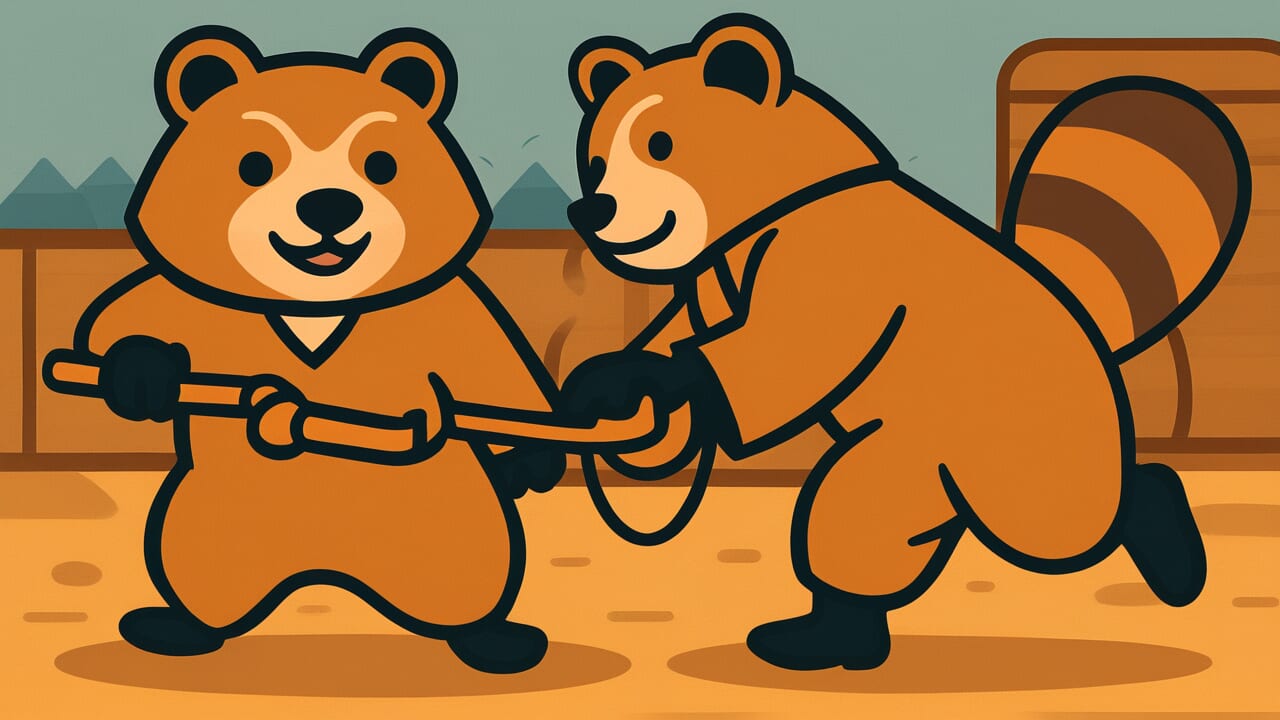How to Read “The owl caller gets called by the owl”
Zuku hiki ga zuku ni hikareru
Meaning of “The owl caller gets called by the owl”
“The owl caller gets called by the owl” means trying to outsmart someone, only to fall into their trap instead.
This proverb teaches that the moment you think you have the upper hand is often the most dangerous.
It describes a situation where someone plots to trap another person. But the other person is actually more clever and manipulates the schemer without them realizing it.
This saying applies to many situations. Business negotiations, competitions with rivals, or everyday scheming in relationships.
People use it especially when someone thinks they made a brilliant plan. But it turns out everything went exactly as their opponent wanted.
The reason for using this expression goes beyond simply saying “I failed.” It emphasizes the ironic reversal of fortune.
The image powerfully conveys how the hunter and hunted switch places.
Origin and Etymology
Clear written records about this proverb’s origin are limited. However, the structure of the phrase reveals an interesting background.
“Zuku” is an old word for a type of owl. “Zuku hiki” refers to someone who hunts using owls or a hunter who lures owls.
During the Edo period, hunting with birds was widely practiced. Hunters had techniques to lure prey by imitating owl calls or using decoys.
Owls were known as nocturnal and intelligent birds. They were not easy to catch.
This proverb likely emerged from reversals that happened during such hunts. A hunter using all their wit to catch an owl gets outwitted by the owl’s cleverness instead.
Or perhaps a hunter trying to lure one owl with calls gets drawn in by a real owl. Such scenes probably gave birth to this expression.
The phrase vividly captures the moment when hunter and hunted reverse positions.
Interesting Facts
The word “zuku” is an old name for owl species, often referring specifically to horned owls. Some say the sound “zuku” represents the actual cry of this bird.
This suggests Japanese people have been listening to these birds in night forests since ancient times.
Owls have long been symbols of wisdom. Their night vision, silent flight, and ability to catch prey reliably made them feared as “intelligent birds.”
When you consider that this proverb involves the battle of wits between hunters and such clever birds, the meaning becomes even deeper.
Usage Examples
- We tried to spy on our rival company, but they stole our confidential information instead. The owl caller gets called by the owl.
- I plotted to trap him, but he saw through everything and used me. This is exactly what “the owl caller gets called by the owl” means.
Universal Wisdom
“The owl caller gets called by the owl” vividly portrays the downfall that human arrogance and carelessness bring.
People become most defenseless when they feel they have the upper hand. When plotting to outsmart someone, our hearts soar with excitement and we feel certain of success.
But that very moment is the greatest danger. Because the other person might be thinking the same way.
This proverb has been passed down through generations because it touches on a fundamental human weakness. We tend to overestimate our own cleverness and schemes.
Assumptions like “they’re inferior to me” or “this plan is perfect” narrow our vision.
The deeper truth is that in battles between schemers, there’s always someone better. No matter how clever our plan, we forget that someone with superior wisdom might exist.
Our ancestors must have witnessed this reversal many times. Seeing those skilled in intrigue defeated by even more cunning strategists.
They recognized a universal structure in human society. The truth that a life of scheming always carries the risk of betrayal.
When AI Hears This
A hunter imitating owl calls to lure owls gets captured by companions who mistake him for a real owl. This phenomenon can be explained by the cognitive process called “role internalization.”
The human brain cannot completely distinguish between acting and reality. Just as making yourself smile actually improves your mood, continuing to play a role causes the brain to incorporate that role as part of the self.
In the Stanford Prison Experiment, students playing guards transformed into truly authoritarian personalities within just days. This happens because the prefrontal cortex’s self-recognition system gets rewritten by repeatedly receiving “false input” from acting.
More interesting is research showing that deceivers are especially prone to self-deception. When lying, people try to believe their own lies to convince others.
This is also the brain’s energy-saving strategy to reduce cognitive load. Processing one “truth” is more efficient than managing both lies and truth.
In other words, the owl caller faces a trap where the act of deceiving others rewrites their own cognition. The more skilled the actor, the greater the risk of losing track of who they really are.
Con artists believing their own scams or salespeople genuinely thinking their product is good are unavoidable phenomena given how the brain works.
Lessons for Today
This proverb teaches modern people the value of honesty and humility over petty schemes.
In modern society, competition to stay one step ahead intensifies in both business and relationships. But this proverb warns us.
The very attitude of trying to outsmart others makes you vulnerable.
What matters is constantly asking yourself whether you’ve become an “owl caller.” Are you trying to manipulate someone? Are you overconfident in your cleverness?
And most importantly, are you underestimating the other person?
Rather, having the courage to respect others’ abilities and face them directly might be the safest path. Schemes may bring temporary advantage, but they always carry the risk of betrayal.
If you’re currently thinking of outsmarting someone, pause for a moment. Is that scheme really necessary?
Being honest and sincere might, in the long run, give you the greatest weapon of all: trust. True wisdom isn’t about scheming, but about knowing your own limits.



Comments